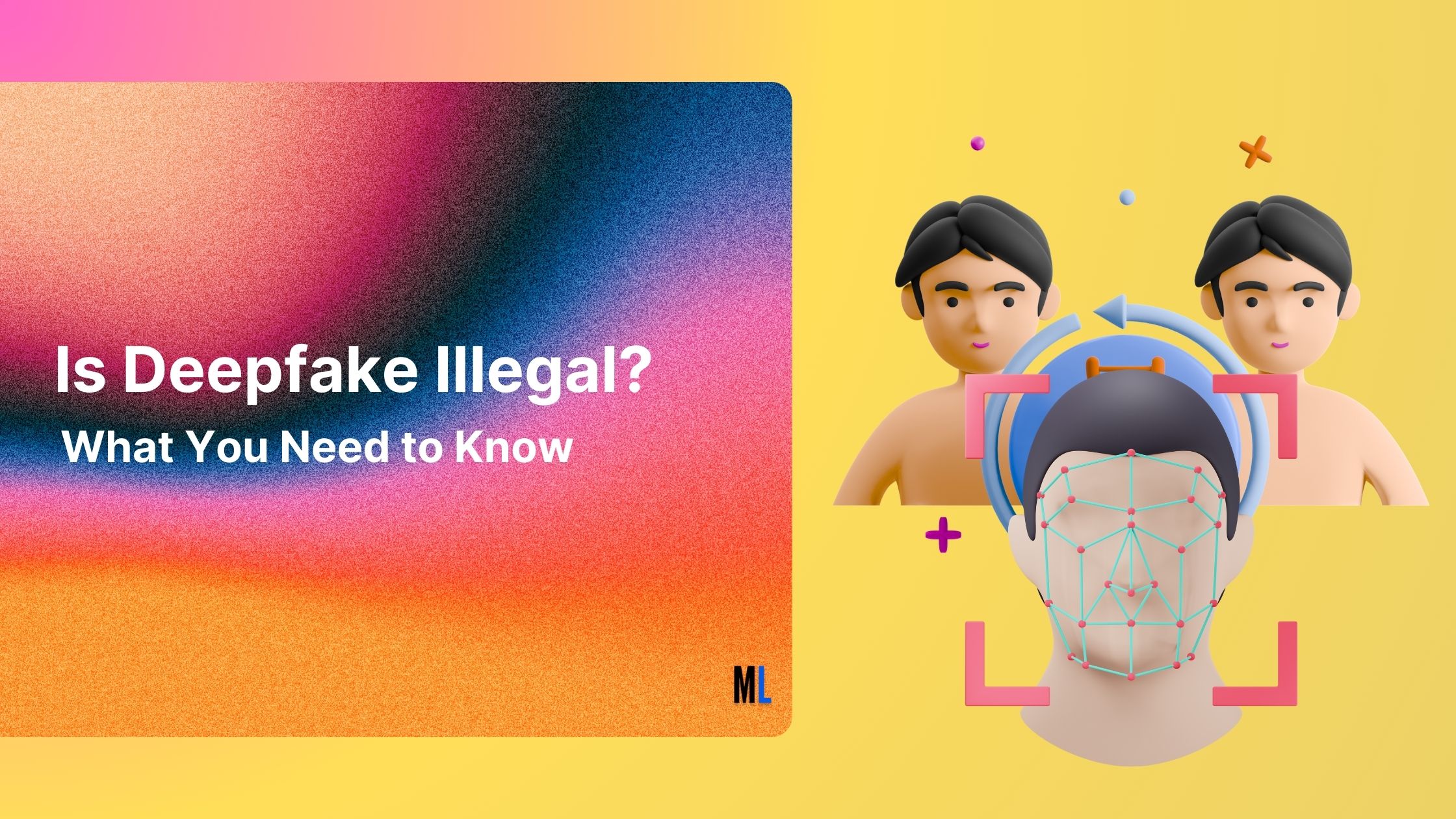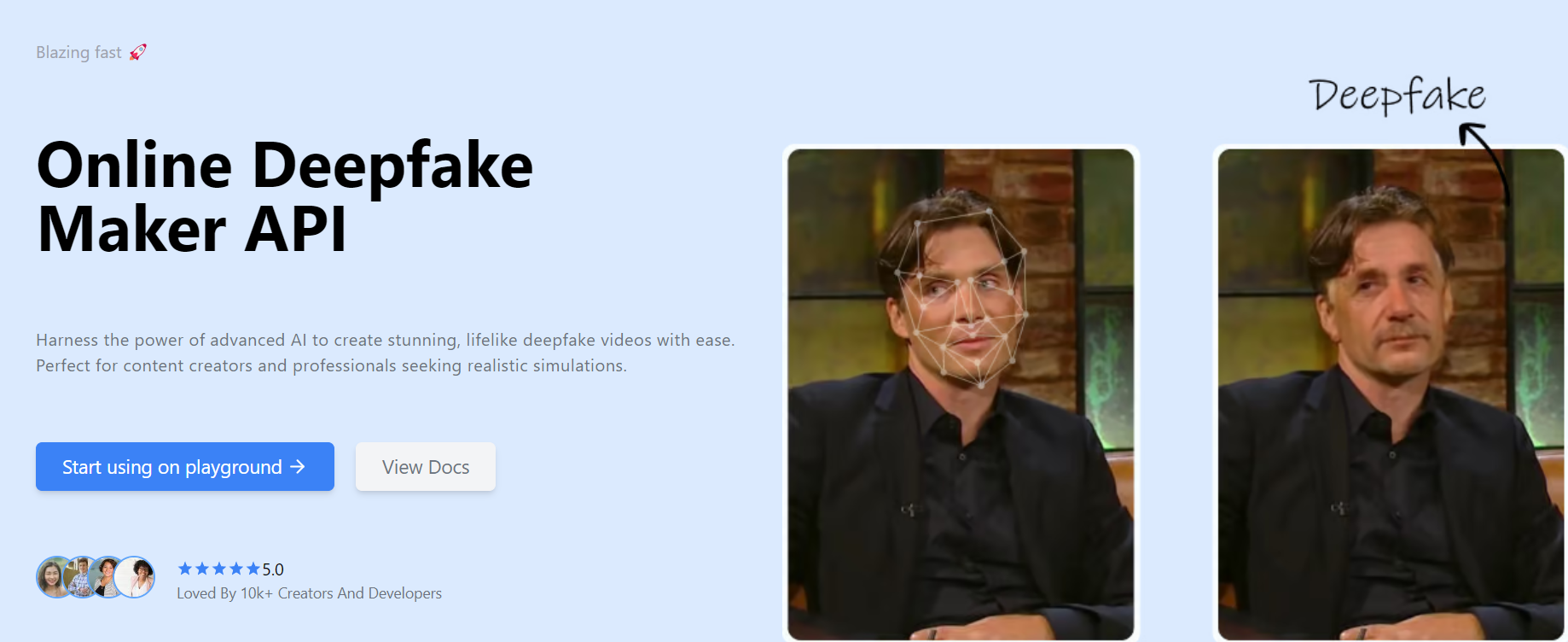Is Deepfake Illegal? What You Need to Know.
Written on . Posted in AI.
Is Deepfake Illegal: Everything You Need to Know
The number of deepfakes is growing rapidly. Some are created by content creators, some by small advertising startups, and others are making deepfakes for cloning popular voices. They are fascinating to watch, but there are serious concerns related to them.
There is no doubt that deepfakes are entertaining, amazing, and can be helpful for different purposes. However, they can also be misused to spread lies, and misinformation, and commit fraud. This leads us to an important question: "Is deepfake illegal?"
In this article, we'll explore what deepfakes are, the potential problems they can cause, and what the law says about them. By the end, you'll have a better understanding of the legal side of deepfakes, why it's important to regulate them, and how to use deepfakes by following all regulations.
What is Deepfake Technology and Why is it a Concern?
Deepfake is a combination of "deep learning" and "fake," using advanced AI technology to create or alter content to appear real with fabricated scenes. There are many technical steps involved, but for now, understanding its meaning suffices.
Learn more! [What is deepfake and how does it work?]
Creating deepfake videos has become easy due to user-friendly software like Modelslab and available online data. Advanced AI tools needed for making deepfakes are widely available, allowing almost anyone with basic resources to create realistic images, videos, and voices.
Social media platforms rapidly spread deepfakes worldwide, often making them popular before their authenticity is questioned. Sometimes, these deepfakes might be a concern if misused.
Notable examples include a fake arrest of Donald Trump, a song featuring Narendra Modi's voice, and announcement videos of Mark Zuckerberg.
Potential Harms of Deepfakes
Deepfakes pose significant threats in various ways, particularly in terms of defamation, privacy invasion, and reputational damage. Let's explore these issues further:
Defamation: Deepfake technology can be used maliciously to create false narratives, such as portraying a public figure saying something they never said. This kind of digital defamation not only attacks individuals personally but can also manipulate public opinion and disrupt democratic processes.
Privacy Invasion: Some people intentionally or accidentally damage someone's reputation by creating deepfakes without their consent, often placing them in compromising situations. This invasion of privacy can affect their daily life.
Damage to Reputation: For businesses, manipulated videos could falsely show executives involved in illegal or unethical activities, leading to a loss of customer trust, falling stock prices, and lasting damage to the corporate reputation.
The current legal system can't fully handle the complexities of deepfake videos. Efforts are being made worldwide to create laws to address this issue, highlighting the need for deepfake detection tools.
Are Deepfakes Illegal?
The legal status of deepfakes is complex and evolving. While not inherently illegal, they can violate existing laws related to privacy, intellectual property, defamation, harassment, and fraud. The challenge is that current laws were not designed with deepfakes in mind, making it difficult to address their unique issues.
Here are some key laws in current legal frameworks:
Privacy Laws
Traditional privacy laws focus on the unauthorized use of personal data, not on the manipulation of someone's likeness in a deepfake. This gap creates confusion and can allow misuse without clear legal consequences.
Intellectual Property Rights
Existing laws protect against unauthorized use of copyrighted material, but they often do not cover the use of someone's likeness or voice, which are frequently exploited in deepfakes.
As deepfake technology advances, there's a growing need for new laws and regulations to address these complexities and potential harms.
Existing Laws to Address the Challenges of Regulating Deepfakes
Here's a short overview focusing on how existing laws intersect with deepfake technology and international efforts to regulate it:
Copyright Laws
To protect original content, it's important to follow copyright law. Using copyrighted material in deepfakes without permission can lead to legal issues. However, laws often struggle to address the unauthorized use of a person's likeness, which is a common issue in deepfakes.
Defamation, Harassment, and Privacy Laws
Laws address defamation, bullying, and privacy violations caused by deepfakes spreading false or harmful information. However, it can be difficult to prove the intent behind the deepfake and the harm it causes, especially when the people who create it remain anonymous.
Laws Against Child Sexual Abuse Material (CSAM)
Manipulating deepfakes for CSAM is unequivocally illegal under strict laws, providing a clear legal basis for prosecution.
International Regulation Efforts
Global forums like the UN and World Economic Forum are discussing ways to regulate deepfakes to balance preventing harm with preserving free speech and innovation.
United States: States like California and Texas are creating laws to address deepfakes, especially those involving adult content and politics. Meanwhile, federal laws on deepfakes are still in development.
European Union: The AI Act identifies certain AI systems, including some deepfakes, as high-risk. It requires these systems to meet specific standards for transparency and responsibility to ensure they are used ethically and safely.
Other Countries: Countries like South Korea and Australia are creating or enforcing their deepfake regulations, focusing on consent, privacy, and preventing misinformation.
Various laws are being developed to counter the unethical use of deepfakes. Here are some common questions that might come to mind regarding deepfakes:
Can You Get in Trouble for Searching Deepfake?
Searching for deepfake content online is usually not illegal. However, accessing, sharing, or downloading certain types of deepfakes, like nonconsensual pornographic ones, can be illegal depending on the laws in your area and several circumstances.
Laws can vary, so it's important to be aware of legal boundaries when creating, accessing, sharing or downloading deepfake content online.
Can You File a Case against Someone for Making a Deepfake?
Yes, individuals can legally sue for the creation of deepfakes on grounds such as defamation, emotional distress, and infringement of intellectual property rights. Celebrities and public figures, in particular, can argue that their likeness has been unlawfully used or misappropriated.
However, several factors complicate these cases:
First Amendment Protections: In the United States, deepfake creators may claim protection under the First Amendment, which guarantees free speech. Courts must balance these protections against the harm caused by the deepfake.
Difficulty of Identification: Deepfake creators often operate anonymously or through pseudonyms, making it challenging to identify and hold them accountable.
Despite these challenges, people can take legal action against harmful deepfakes, depending on the situation and laws in their jurisdiction.
Is It Illegal to Download Deepfakes?
No, Downloading deepfakes is not always illegal, but it can be illegal in certain cases:
Nonconsensual Pornographic Deepfakes: It's illegal to download or share deepfakes that feature nonconsensual pornographic content in many places.
Copyright Material: Downloading deepfakes that use copyrighted material without permission may violate copyright laws.
It's important to understand the legal risks of downloading deepfake content, as laws vary by country and region.
Is It Illegal to Make a Deepfake?
No, Creating deepfakes isn't always illegal, but it depends on how they're used:
Nonconsensual Pornographic Deepfakes: It's illegal to create deepfakes of people in sexual situations without their consent in many places.
Defamatory Deepfakes: Making deepfakes that spread false and harmful information about someone can lead to legal trouble for defamation.
Emotional Harm: Deepfakes meant to cause emotional distress can also lead to legal action.
Public Figures: Deepfakes involving public figures can have legal consequences, especially if they spread false information.
In short, the legality of making deepfakes depends on what they show, why they're made, and the laws where they're made.
What is the Punishment for Posting an Illegal Deepfake?
Posting a deepfake can lead to different consequences depending on the jurisdiction and intent of the deepfake. Here are some punishments for posting an Illegal Deepfake.
Monetary Fines
In less serious situations, posting a deepfake could result in fines from the court, especially if it violates privacy or intellectual property rights.
Imprisonment
Serious offenses, like posting deepfake porn or deepfakes that threaten national security, can lead to imprisonment. The length of imprisonment depends on the seriousness of the offense and local laws.
Civil Legal Action
Individuals who are victims of deepfakes, such as celebrities or people depicted in revenge porn deepfakes, have the option to file civil lawsuits. They can seek financial compensation for the emotional distress, damage to their reputation, and other harms caused by the deepfake.
The severity of consequences for creating or distributing deepfakes depends on the specific circumstances and the laws in the jurisdiction where it occurs. Therefore, individuals must understand the potential legal and ethical implications involved in these actions.
Conclusion
In this article, we've discussed the fascinating yet concerning world of deepfake technology. While deepfakes can be entertaining and useful, they also raise serious issues like defamation, privacy invasion, and reputational harm. The legal landscape is still catching up with these challenges, making it essential to use deepfake technology responsibly.
Modelslab Deepfake Maker API offers tools for generating text-to-image, text-to-video, text-to-voice, and voice cloning. You can create deepfakes with it, but Modelslab enforces rules to prevent misuse, ensuring deepfakes are created with good intent.

Stay informed about deepfakes and use tools like Modelslab responsibly. Explore ModelsLab’s resources to create ethical and innovative deepfakes.
